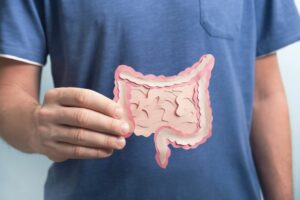IBS or SIBO symptoms? Healthista spoke to The Gut Experts – Professor Barbara Ryan and Elaine McGowan RD. They explain how to tell these common gut issues apart, plus what causes them
Approximately one in ten adults and one in six women have IBS.
IBS (Irritable Bowel Syndrome) is a chronic, functional gastrointestinal condition that affects the lower digestive system (the small intestine and large intestine/colon).
A functional condition is one that causes symptoms of illness, lack of wellbeing and very often significantly reduced quality of life, but where there are no clear measures by which to make a diagnosis.
This means that if you have IBS, all standard tests (blood work, stool samples, endoscopies or scans) will be normal. IBS is one of the most common ‘functional’ gut conditions (there are others) and in recognition of the crucial role of the GBA in these conditions, they are now called Disorders of Gut-Brain Interaction (DGBI).
IBS is diagnosed on the basis of the presence of certain symptoms (the Rome IV criteria) and by ruling out some other common conditions that can cause similar symptoms (such as coeliac disease or inflammatory bowel disease- Crohn’s disease or ulcerative colitis).
READ MORE: Stomach problems? 3 common tummy troubles and how to treat them
SIBO OR IBS – What is the difference?
SIBO is Small Intestinal Bacterial Overgrowth. It quite literally means there is an overgrowth of bacteria in the small intestine.
While the large bowel is home to over 50 trillion bacteria, it isn’t normal to have large numbers of bacteria in the small intestine. The overgrowth of bacteria can interfere with the absorption of particular food components and cause fermentation in the gut.
This can lead to abdominal pain, bloating, excessive wind (often with a strong odour), diarrhoea and other uncomfortable gut symptoms.
When you look at SIBO symptoms and the symptoms of IBS, you can see that they are very similar, and there may be an overlap in some people.
Indeed, studies have shown that SIBO is up to four times more common in IBS sufferers compared to ‘normal’ controls and that around 20-50 per cent of people with IBS have SIBO.
Traditionally, many doctors believed that SIBO only occurred in people who had other underlying medical conditions (like diabetes or neurological conditions which affect gut motility) or in people with structural abnormalities of their gut (after certain surgeries for example).
around 20-50 per cent of people with IBS have SIBO
But there is increasing awareness that this is not always the case and that SIBO is more common in people with diagnosed IBS and may be contributing to some (or less commonly, all) of the IBS-type symptoms.
Diagnosis of SIBO is not a perfect science. A Hydrogen and Methane breath test is the most common test used to detect SIBO.
It’s a simple test but it is only 60-70 per cent accurate – both false negative and false positive results occur. The main established treatment for SIBO symptoms is with a course of antibiotics.
Other treatment options are available including dietary management and herbal remedies. It is not an exact science at this point and it can be a recurring problem.
READ MORE: 5 reasons healthy eating has become SO complicated
Common symptoms of IBS include:
- Abdominal pain (stomach cramps) – which is related to passing a bowel motion
- Diarrhoea or constipation or an alternating between the two
- Change in the stool form / appearance
- Abdominal bloating – women often say ‘I look six months’ pregnant’
- Excessive wind
Currently IBS is classified according to the pattern of bowel habit, for example, some people mainly suffer with constipation, and this is called constipation-predominant IBS (IBS-C).
Others have mainly diarrhoea, and this is called diarrhoea-predominant IBS (IBS-D). Yet others again fluctuate between diarrhoea and constipation and this is called mixed-type IBS (IBS-M). Symptoms can come and go and often get worse at times of stress.
A holistic approach is needed to manage IBS
Many women also find their symptoms worsen around the time of their period. Perimenopause can bring a worsening or an improvement of symptoms depending on hormone fluctuations and this can be hard to predict.
Menopause often affords an improvement in IBS symptoms for those that have been particularly affected by their monthly cycle during their fertile years.
A holistic approach is needed to manage IBS and that includes dietary measures, exercise, nurturing your mental health, getting quality sleep and medication where appropriate.
Why do women suffer with gut issues more than men?
Not all gut conditions are more common in women than men, However, IBS is almost three times more common in women than men, meaning that seven out of ten IBS sufferers are women.
Some other digestive conditions are also more common in women, such as coeliac disease and Crohn’s disease. A number of factors are likely playing a role in these differences; genetics, hormonal factors, the gut microbiota (GM) and dietary differences may all be factors.
Both oestrogen and progesterone have a significant impact on gut function and changes in the levels of these hormones during the monthly menstrual cycle and during menopause transition can affect gut motility (leading to constipation or diarrhoea) and can also affect pain sensation within the gut.
Both oestrogen and progesterone have a significant impact on gut function
Hormones may be one of the factors explaining why IBS is so much more common in women.
Many women become pregnant and give birth, and a normal labour puts significant strain on the pelvic floor muscles, and sometimes these muscles never fully recover back to their pre-labour strength and condition.
Pelvic floor problems (dysfunction) can contribute to significant gut symptoms such as constipation.
The GM differ in men and women, and also change in women post menopause. Given the complex and not yet fully understood role of the GM in a number of gut conditions, it is possible that GM differences may also be playing a role in the gender differences seen in some gut conditions, most notably IBS.
What is the one thing all women should know about their gut?
Every woman should know that her digestive system is unique and that there is no one-size-fits all solution in terms of diet.
The effects of hormonal fluctuations (during the monthly menstrual cycle) or during menopause transition (perimenopause and menopause) will affect each woman differently, although there are common features.
there is no one-size-fits all solution in terms of diet
Similarly, if you suffer with IBS, you do not need to cut out lots of different food groups, but you do need to find your own personal tolerance levels for some particular ‘culprit’ foods that can act as triggers of your gut symptoms.
We explore these common triggers in our book, What Every Woman Needs to Know About Her Gut and offer a diet and lifestyle plan called The FLAT Gut Diet Plan which can help you to identify your common dietary triggers in a systematic way. It also helps you to find your individual tolerance level for these foods.
What causes an unhealthy gut?
Many different digestive and gut conditions exist and can cause some of the symptoms we’ve just discussed.
Some conditions can be very effectively managed through diet and lifestyle measures, whereas other conditions are best treated with medication, as well as diet and lifestyle measures.
The main distinction is between ‘organic’ and ‘functional’ gut conditions.
What is an organic condition?
An organic condition or disorder is the term used by doctors to describe any medical condition (affecting any part of the body) where observable and measurable abnormalities can be detected.
These conditions can be diagnosed through blood or stool
In other words, the results of certain, appropriate tests will show up this condition if you have it. These conditions can be diagnosed through blood or stool (in the case of gut problems) tests.
These biological measures are known as biomarkers. Scans such as x-rays, ultrasound, CT or MRI can also detect abnormalities in organic conditions.
Examples of organic conditions that can affect the gut are:
- Gastro-oesophageal reflux disease (GORD/ GERD)
- Peptic ulcers
- Coeliac disease
- Gallstones
- Diverticulosis / diverticulitis
- Inflammatory bowel disease (IBD), which includes Crohn’s disease and ulcerative colitis
- Cancers of the digestive system
READ MORE: 5 IBS fixes proven by science
What is a functional condition?
We mentioned functional gut conditions earlier when we spoke about IBS.
A functional condition is one that causes symptoms of illness, lack of wellbeing and very often significantly reduced quality of life, but where there are no clear measures by which to make a diagnosis.
These conditions can be harder to diagnose definitively and can be very frustrating for those experiencing them, as there is generally no quick ‘cure’.
Psychological factors such as low mood, stress and anxiety play a role in many of these conditions
The lack of a definitive diagnostic test can generate concern that something may have been missed. People with these conditions also feel that doctors (and family and friends) do not understand the extent to which the symptoms are affecting them and their life, or that their symptoms are somehow imagined.
The Rome IV criteria describe over 40 different functional gut conditions, or DGBIs. Psychological factors such as low mood, stress and anxiety play a role in many of these conditions just as they do in every part of our lives, but there are usually other factors or triggers playing a role also.
Examples of functional conditions affecting the gut (DGBIs) are:
- IBS
- Functional dyspepsia
- Functional biliary / gallbladder disorders
- Functional abdominal pain syndrome
- Functional abdominal bloating
The importance of getting a proper diagnosis and not self-diagnosing cannot be overstated, as different conditions will require different approaches to management and treatment.

Follow The Gut Experts on Instagram @thegutexperts
Like this article? Sign up to our newsletter to get more articles like this delivered straight to your inbox.

























































